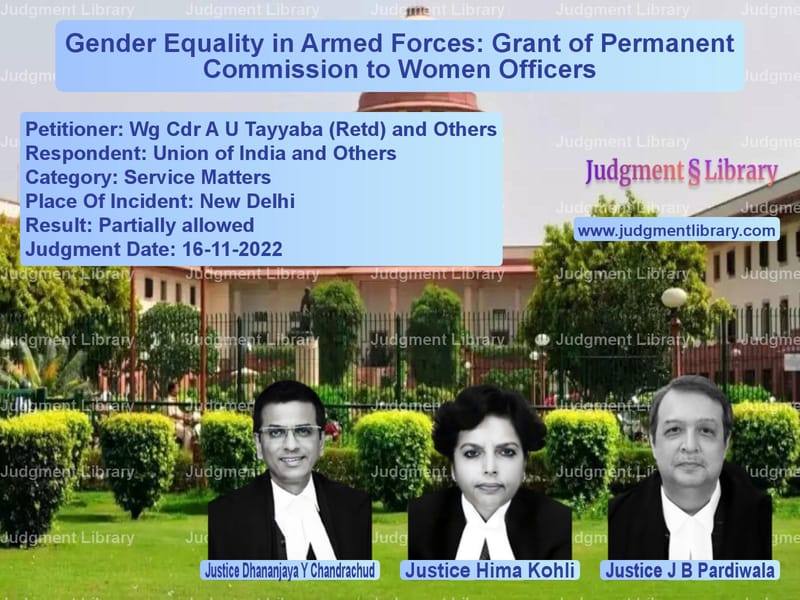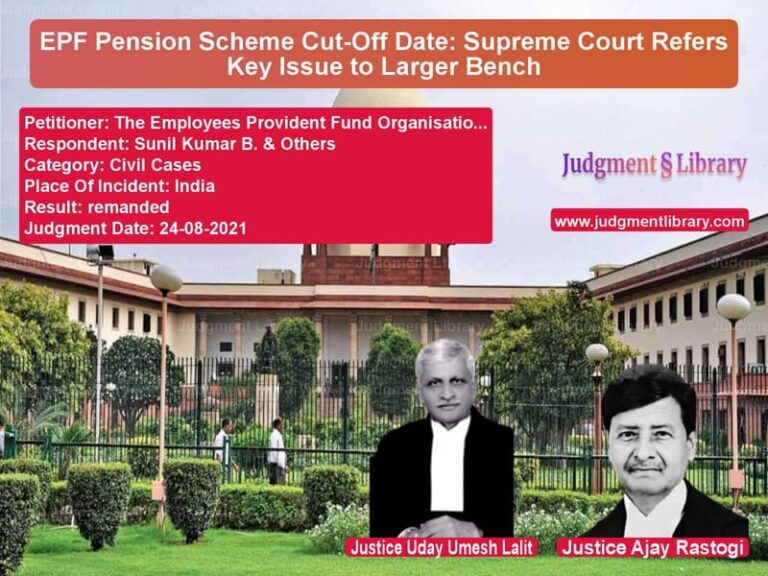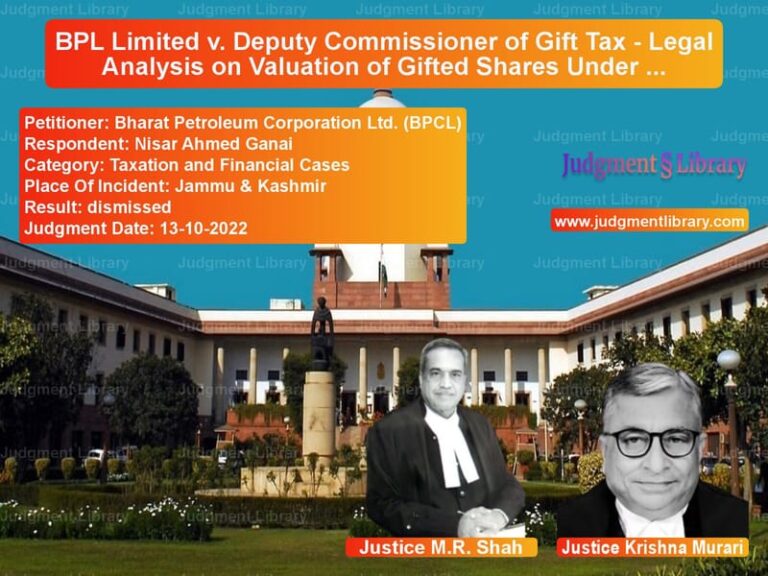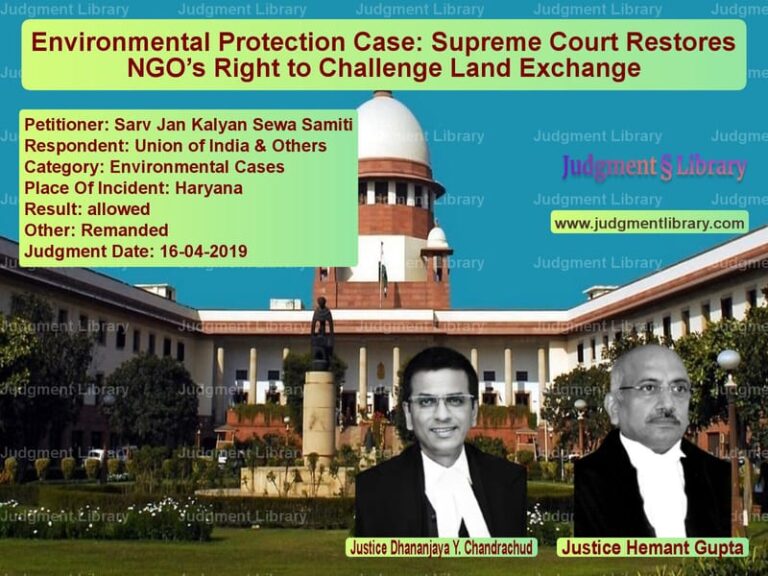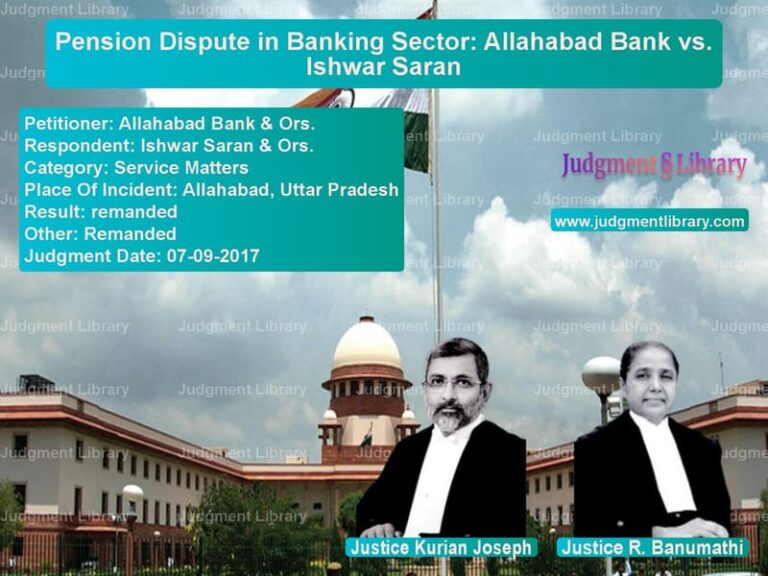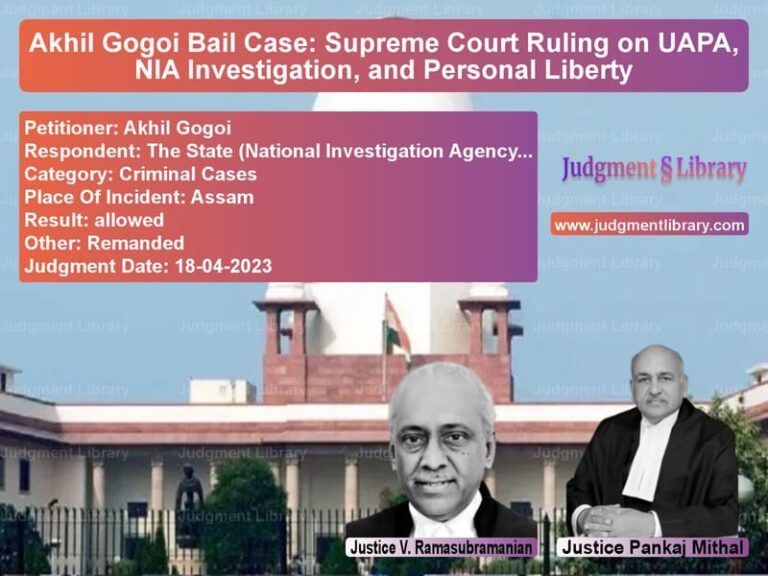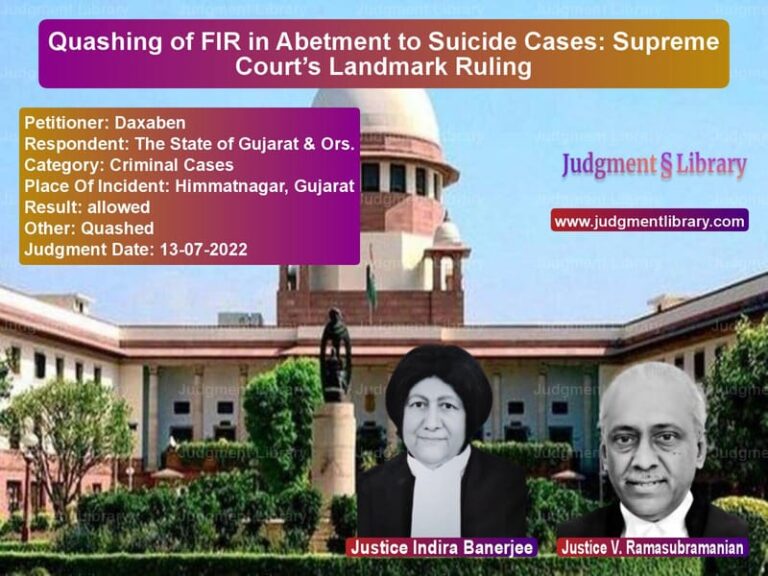Gender Equality in Armed Forces: Grant of Permanent Commission to Women Officers
This judgment addresses the ongoing issue of gender discrimination within the Indian Armed Forces, specifically regarding the grant of Permanent Commission (PC) to women Short Service Commissioned Officers (SSCOs) in the Indian Air Force (IAF). The dispute stems from a judgment of the Delhi High Court, which was followed by several writ petitions challenging the implementation of the decision. The case involves women officers who, despite meeting the eligibility criteria, were denied the grant of PC.
Background of the Case
The appellants in this case are women officers who joined the Indian Air Force (IAF) between 1993 and 1998 under the Short Service Commission (SSC) scheme, as per a policy circular issued by the IAF in November 1991. The circular provided that SSCOs would be initially granted SSC for five years, with the possibility of transitioning to a Permanent Commission (PC) based on vacancies and suitability. Despite fulfilling the necessary conditions for PC, the women officers were not granted PC and were instead given an extension of their SSC.
The issue first came to light when Babita Puniya, a woman SSCO, filed a Public Interest Litigation (PIL) in 2003, challenging the gender discrimination in the grant of PC. The PIL led to the Delhi High Court’s judgment in March 2010, where the Court ruled in favor of women SSCOs, recognizing their right to be considered for PC on equal terms as male officers.
In response to the High Court’s decision, a policy was formulated in 2006 that continued to deny PC to women officers. This was followed by a revised policy in 2008 that allowed the grant of PC to women officers, but only in specific branches such as the JAG Department and the Army Education Corps. The appellants, who had joined the IAF under the original policy, were left out of these benefits. Despite this, a few women SSCOs were granted PC following the 2010 judgment in Babita Puniya’s case. However, the appellants were excluded from this list, leading them to challenge the implementation of the policy and the denial of their legitimate expectation to be considered for PC.
The Legal Arguments
The appellants contended that they had a legitimate expectation to be granted PC based on the policy and advertisements issued when they joined the IAF. They argued that the government’s representation in the 1991 circular, which promised that SSCOs would be considered for PC based on suitability and vacancies, created an enforceable expectation that should be honored. Furthermore, the appellants argued that the non-consideration for PC violated the doctrine of legitimate expectation, which is grounded in fairness and transparency in governmental decisions.
The respondents, on the other hand, contended that the appellants were not entitled to the benefit of the Babita Puniya judgment because they had not filed petitions in the Delhi High Court while they were still in service. They further argued that the grant of PC was subject to availability and suitability, and that the policy had evolved over time, with the latest guidelines being applied uniformly to male and female officers.
The Court’s Consideration
The Court acknowledged the issue of gender discrimination that had been brought to light by the appellants, particularly in the context of their legitimate expectation of being granted PC. It noted that the representation made by the IAF in the 1991 circular created an expectation among the women SSCOs, and that the government should have fulfilled its promise. The Court referred to the principles of legitimate expectation, which require the state to act fairly and consistently with the representations it makes.
Furthermore, the Court examined the decisions made in the Babita Puniya case and recognized that the judgment applied to those women officers who had filed petitions before the Delhi High Court. The issue was whether the appellants, who were released from service before the judgment was delivered, could also benefit from the judgment. The Court concluded that the appellants had a reasonable and legitimate expectation of being considered for PC based on the original policy.
Read also: https://judgmentlibrary.com/supreme-court-upholds-uttarakhands-policy-on-b-ed-college-recognition/
The Court’s Judgment
The Court ruled in favor of the appellants, granting them the benefit of the Babita Puniya judgment. However, it also considered the practical implications of reinstating officers who had been released from service several years earlier. The Court recognized that reinstating these officers would not be feasible due to the time elapsed since their release, and it was not possible to place them back into active service. Instead, the Court directed that the appellants be considered for pensionary benefits as a form of compensation for the denial of their rightful claim to PC.
Additionally, the Court directed that the appellants be evaluated based on the Human Resources Policy (HRP) issued in November 2010, which outlined the criteria for granting PC to women SSCOs. The HRP specified the Qualitative Requirements (QRs) for granting PC, including performance ratings, professional qualifications, and behavioral factors.
Conclusion
The judgment in this case highlights the importance of the principle of legitimate expectation in government dealings, particularly in the context of promises made to employees or officers. The Court recognized that the appellants had been unfairly denied their rightful claim to PC, and granted them pensionary benefits as compensation. This judgment also emphasizes the need for gender equality in the armed forces and the importance of ensuring that women officers are treated equally to their male counterparts, particularly in matters of career progression and benefits.
Petitioner Name: Wg Cdr A U Tayyaba (Retd) and Others.Respondent Name: Union of India and Others.Judgment By: Justice Dhananjaya Y Chandrachud, Justice Hima Kohli, Justice J B Pardiwala.Place Of Incident: New Delhi.Judgment Date: 16-11-2022.
Don’t miss out on the full details! Download the complete judgment in PDF format below and gain valuable insights instantly!
Download Judgment: wg-cdr-a-u-tayyaba-(-vs-union-of-india-and-o-supreme-court-of-india-judgment-dated-16-11-2022.pdf
Directly Download Judgment: Directly download this Judgment
See all petitions in Employment Disputes
See all petitions in Promotion Cases
See all petitions in Workplace Harassment
See all petitions in Judgment by Dhananjaya Y Chandrachud
See all petitions in Judgment by Hima Kohli
See all petitions in Judgment by J.B. Pardiwala
See all petitions in partially allowed
See all petitions in supreme court of India judgments November 2022
See all petitions in 2022 judgments
See all posts in Service Matters Category
See all allowed petitions in Service Matters Category
See all Dismissed petitions in Service Matters Category
See all partially allowed petitions in Service Matters Category

